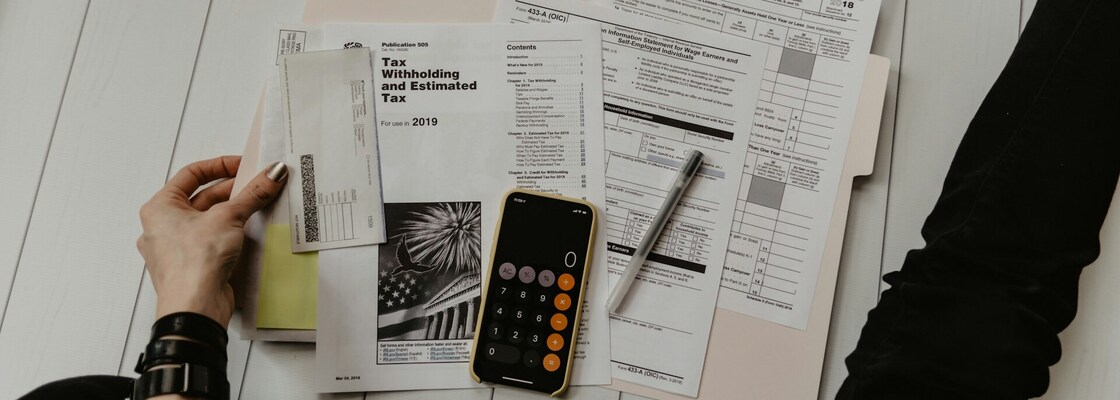Over the past few years, Portugal has become a popular destination for expats seeking a high quality of life surrounded by captivating landscapes, a warm climate, and a rich cultural heritage.
However, along with familiarizing yourself with the country’s picturesque regions, enjoying the affordable cost of living, and immersing yourself in Portuguese culture, navigating the Portuguese tax system and understanding its nuances is an important part of relocating to Portugal.
In this article about taxes in Portugal for foreigners, we’ll explore everything you need to know to make filing your annual tax return as seamless as possible. We will discuss how to register to pay tax in Portugal, the different types of taxes and their tax rates, give you an overview of property tax and equip you with everything else you need to know to make managing taxes less of a daunting experience.
An Overview of the Portuguese Tax System

Taxes are probably one of many people’s least favorite topics. However, like most countries around the globe, the Portugal tax system is intricate, and expats must be able to navigate it to enjoy this Western European gem’s affordable living costs, vibrant culture, and picturesque regions on a daily basis.
So, who is required to pay tax in Portugal? This is determined primarily by your residency status. According to Portuguese tax laws, citizens and foreign residents living in Portugal for 183 days or more per year are considered to be a tax resident and are liable for paying annual income tax returns.
Obtaining permanent residence in Portugal by the end of the tax year and working in Portugal for a Portuguese company will also mean that you are required to pay tax in Portugal.
As a Portuguese citizen or foreign resident, you will need to pay income tax in Portugal on the following income sources that are considered to be taxable income:
- Employment income from a Portuguese company
- Worldwide income or foreign income
- Self-employment income
- Foreign pension income
- Investment income
- Corporate income
- Capital gains
- Inheritance and gifts
It is important to note that tax residents in Portugal are taxed on their worldwide income at progressive rates ranging from 13.25 percent to 48 percent. Non-residents in Portugal are only liable to pay income tax on Portuguese-sourced income, and tax credits are available for foreign taxes paid on foreign-source income.
Understanding the Types of Taxes in Portugal
Now that we have given you an overview of taxable income in Portugal, Portugal’s tax system, and who is liable to pay taxes in the country, we will explore the types of federal taxes that need to be paid in more detail below.
Personal Income Tax (IRS)
Portuguese residents and non-residents who earn income in Portugal are liable for paying the Portuguese income tax on their gross income, referred to as the IRS, annually.
The Personal Income Tax rates range between 13.25 percent and 48 percent, and the amount paid is determined by the total taxable income earned, excluding legal tax deductions such as health insurance, household expenses, and limited amounts for dependents who do not earn an income or earn an income below the minimum pension amount.
Even though tax residents still need to complete a tax return annually, income taxes are automatically deducted from monthly pay slips on a Pay as You Earn (PAYE) basis. The table below showcases the current percentages of income tax rates allocated to each income bracket:
Taxable Income (€) | Tax Rate (%) | Amount Deducted (€) |
7,703 | 13.25 | 0 |
11,623 | 18 | 365.89 |
16,472 | 23 | 947.04 |
21,321 | 26 | 1,441.14 |
27,146 | 32.75 | 2,880.47 |
39,791 | 37 | 4,034.17 |
51,997 | 43.50 | 6,620.43 |
81,199 | 45 | 7,400.21 |
81,199 + | 48 | 9,836.45 |

Corporate Income Tax (CIT)
In addition to individual income tax liability, Portuguese tax residents who own a company in the country and generate Portuguese-sourced income will need to pay business taxes to the Portuguese Tax Authorities, also known as Corporate Income Tax (CIT).
On mainland Portugal, the Corporate Income Tax rate is set at a flat rate of 21 percent on the total taxable income of that Portuguese tax year, while the tax revenue rate in the autonomous regions of Madeira and Azores is set at 14.7 percent.
Corporate Income Tax benefits include a reduced corporate tax rate of 17 percent for small businesses and medium-sized enterprises on the first €50,000 in taxable profit. Portuguese corporate tax returns must be filed between 16 April and 16 May each year.
It is important to note certain changes to business taxes in Portugal for foreigners. According to The Portugal News, Minister of the Presidency Leitão Amaro recently announced that the government has approved the decision for multinational companies operating in Portugal to be subject to a 15 percent CIT at a flat rate.

Value Added Tax (VAT)
Also known as consumption tax, Value-Added Tax (VAT) is applied to sales and service transactions in Portugal.
Consumers pay VAT when purchasing goods or services with the seller or service provider collecting and remitting the VAT to the Tax and Customs Authority (AT). Businesses operating in Portugal with a turnover exceeding €10,000 on taxable goods and services are mandated to pay VAT to their local tax office.
Portugal has three VAT rates. First, there is a standard rate of 23 percent, which is 22 percent in the Autonomous Region of Madeira and 16 percent in the Autonomous Region of the Azores. Secondly, there is the reduced rate of 13 percent, which is 12 percent in Madeira and 9 percent in the Azores, and thirdly, the super-reduced rate of 6 percent, which is 4 percent in Madeira from 1 October 2024 onward and 4 percent in the Azores.
The reduced rate of 13 percent on mainland Portugal, 12 percent in Madeira and 9 percent in the Azores is applied to products and services that include meals at restaurants and take away, musical instruments, and agricultural tools.
The super-reduced rate is applicable, which stands at 6 percent on mainland Portugal, 4 percent in Madeira from 1 October 2024 onward, and 4 percent in the Azores is applied to the supply of items that include essential food products, books and pharmaceutical products and hotel accommodation.

Property Tax
Foreign property owners and property owners with Portuguese tax residence are liable for paying property taxes in Portugal at the time of purchase and annually. In the sections below, we will explore the local taxes you will need to pay for property in Portugal.
Property purchase tax (IMT)
Property purchase tax (IMT) must be paid by the property owner during the property acquisition process. The Imposto Municipal sobre as Transmissões Onerosas de Imóveis (IMT) (Municipal Tax on Onerous Transmissions of Real Estate) is a property transfer tax levied over the purchase price of the real estate in Portugal you’re investing in and must be paid when buying the property.
The overall tax rate ranges between 0 and 10 percent. The 0 to 8 percent range depends on the price, location, property type, and your intended use for the property, while the fixed rate of 10 percent will apply in cases where the buyer has connections with territories that benefit from favorable taxation schemes, known as blacklisted jurisdictions.
Immovable Property Tax (IMI)
After you have successfully purchased residential real estate in Portugal, you will need to pay the annual Imposto Municipal sobre Imóveis (IMI), a council tax also referred to as the Municipal Property Tax. Each of Portugal’s municipalities has its own tax rate, and IMI is levied on the property tax value (VPT), not on the price you paid for the property.
The Immovable Property Tax ranges from 0.3 to 0.45 percent for urban properties, which can also increase to 0.5 percent. The IMI rate applied to rural or rustic buildings is 0.8 percent, and real estate owned by residents in a black-listed jurisdiction or by entities in a direct or indirect domain or control relation with entities domiciled in tax havens pay an IMI rate of 7.5 percent.
Stamp Duty
The Imposto do Selo, also referred to as Stamp Duty or Stamp Tax, is an additional transaction cost property buyers are charged on deeds, contracts, bank mortgages and loans, paperwork, and property titles as a buyer.
The Stamp Duty rate for purchasing a property in Portugal is 0.8 percent of the value of the business or the value of the property and is levied on whichever value is higher. If the property is gifted or donated, the Stamp Duty for the transaction will be 10 percent.

Additional to the IMI (AIMI)
Portugal does not have the tax burden of wealth tax. However, there is a tax referred to as Additional to IMI (AIMI) applied to properties of a high value. Real estate owners who have purchased a property in Portugal that is valued at more than €600,000 will need to pay AIMI, which can be calculated as follows:
- 0.7 percent tax on owning property valued between €600,001 and €1 million
- 1 percent tax on property valued between €1mil and €2 million
- 1.5 percent tax on property if its total value is above €2 million

Capital Gains Tax
Capital Gains Tax on the sale of real estate in Portugal is based on the real estate added value, which refers to the amount obtained by subtracting profit from the property’s sale value. The income assessed and taxable profits depend on the property owner’s tax residence status.
Capital Gains Tax for non-residents
Capital Gains Tax in Portugal is calculated based on ownership structure, residency status, and the property’s role – whether it serves as a primary residence or secondary housing. The tax rate is 28 percent for non-residents.
Non-Portuguese residents are taxed on the whole gain on the sale of a property at the flat rate of 28 percent. For taxation to take effect, the property owner must disclose the property’s purchase details, including any renovations, along with invoices serving as evidence for capital gains assessment.
Capital Gains Tax for Portuguese residents
For Portuguese residents, Capital Gains Tax is subject to Portugal tax rates ranging from 13.25 percent to 48 percent, depending on income brackets. The tax on capital gains is only levied on 50 percent of the added value resulting from the acquisition value and the sale value. The Capital Gains Tax rate is applied to this result.
The property owner must disclose the tax return, the year the house was bought, and the price paid to acquire it. If work was carried out on the property, including work such as installing a new heating system, this should be declared. Present the invoices and the amounts paid for the maintenance, and they will be considered in the capital gains assessment.
An important note is that if you are reinvesting your total selling price into a new home, then the potential capital gain can benefit from tax exemptions. However, this is only applicable if the house that you are selling is your permanent residence address and if it corresponds with your tax address.
The time period is also essential—you must purchase a new house and reinvest the total selling price 24 months before such a sale or 36 months after the sale. If this is followed, the owner informs the Portuguese Tax Authority of their intention to reinvest back into the property market in Portugal.

Inheritance tax
According to Portugal tax laws, there are no gift or inheritance taxes in Portugal for expats or citizens. However, a 10 percent Stamp Duty rate is applied to assets considered to be in the Portuguese territory passed on as inheritance. Tax exemptions are available if the inheritance is passed on to spouses and descendants.
Acquiring Tax Residency in Portugal

To register for taxes in Portugal for foreigners, you will need to apply for a Portuguese tax identification number, referred to as a NIF number or Número de Identificação Fiscal. You can apply online through the designated Portuguese government website or by visiting a Finanças, which is a local tax office in person.
Once you have your NIF, you will need to fill out a form indicating your commencement of tax activity and submit it to your local tax office. The form is accessible through the Portuguese Tax Agency’s online portal (Portal das Finanças).
Our residency and citizenship division, Global Citizen Solutions, has created this How to get a NIF (Tax Identification Number) in Portugal: A Guide for Expats, which will help you navigate the process step-by-step.
Although it is not a strict requirement, working with an accountant or tax expert is advised. They can guide you through the process, navigate the language barrier, and help you avoid potential issues like double taxation or other unforeseen complications.
Filing a Tax Return in Portugal

Knowing how to file your income tax return is essential, and having the assistance of an accountant or tax expert can make the process less daunting and as seamless as possible.
Tax filing dates in Portugal follow the calendar year and run from 1 January to 31 December, with tax return dates typically falling between April and June of the subsequent year. Your tax return can be completed conveniently either online via the Portuguese Tax Authorities’ website or by utilizing printed forms and submitting them to your local tax authority office in person.
Below, we share a short step-by-step guide to help you navigate through submitting your tax return efficiently.

How to submit your tax return in Portugal
- Compile all relevant documents required for your tax return
- Visit the Finanças Portal of the Portuguese government if you’re filing online
- Log in using your NIF (tax identification number) and password
- Navigate to the file return section, review the pre-filled statement, and make any necessary changes
- Click on simulate to obtain a provisional calculation of your tax liability
- Review the payment or rebate information provided
- Submit your tax return by clicking file
Remember, that working with an accountant or tax expert throughout this process can make the experience less daunting and as seamless as possible.
Double Taxation Treaties

For Portuguese residents, tax withheld is the payment made for annual corporate or individual income tax due. For non-residents, tax withheld is the final tax payment made for the annual tax year, in which case it is a payment on account.
The Portuguese government has signed double taxation treaties with several countries, including the United States of America, the United Kingdom, and the United Arab Emirates.
If you meet certain eligibility requirements which you can find out more about from a tax expert or the Portuguese Tax Authority, these tax treaties reduce the amount paid for the tax rates applied to dividend income, interest, royalties, bank deposits, property or rental income, service charges, and the remuneration of board members.
Using this list created by PWC Portugal, you can see the tax treaty rates applicable to your home country and discover whether you qualify for any tax advantages.

Social Security and Pension Taxation
Non-habitual residents in Portugal are subject to a fixed rate of 10 percent on foreign source pensions and similar income sources. For Portuguese residents, employers are required to make monthly social security contributions at the standard rate of 23.75 percent on the monthly gross remuneration of their employees. Social security contributions are also deductible for Corporate Income Tax (CIT) purposes.
Why work with BE Global?
BE Global Properties is the discerning property investors’ gateway to meticulously curated properties that transcend ordinary listings. Look no further when searching for your next dream home or investment property in the Portuguese luxury real estate market.
Explore our exclusive listings and work with our experts who offer market insights for smart investment choices and exceptional customer service to find the property investment perfectly tailored for your lifestyle ultimately.
Contact BE Global Properties today and start your journey to find your global haven.
Frequently Asked Questions about Taxes in Portugal
What types of taxes are there in Portugal?
Whether you pay taxes or not in Portugal depends on your residency status. If you spend 183 or more days in Portugal annually, you’re considered a tax resident with full tax liability and will have to pay the same taxes as Portuguese citizens, including Personal Income Tax, Value-Added Tax (VAT), Corporate Income Tax, and Property Taxes.
How does Portugal’s personal income tax work?
In Portugal, Personal Income Tax (PIT or IRS in Portugal) applies to both residents and non-residents earning income within the country. PIT rates range from 13.25 percent to 48 percent and depend on total taxable income earned within that financial year. For expats working for Portuguese companies, taxes are deducted monthly via the Pay as You Earn (PAYE) system, but filing annual returns is still a requirement. You also receive tax deductions on health insurance and household expenses.
How are corporate taxes calculated in Portugal?
On mainland Portugal, Corporate Income Tax (CIT) is calculated at a flat rate of 21 percent on taxable income. Reduced CIT rates of 14.7 percent are available in the autonomous islands of Madeira and the Azores. Small and medium-sized businesses benefit from a 17 percent rate on the first €50,000 in profits.
What are the property taxes in Portugal?
There are a few property taxes to take into consideration when investing in property in Portugal. During property acquisition, buyers must pay the Property Purchase Tax (IMT), which ranges from 0 to 8 percent, depending on the property’s price, location, and intended use. A 10 percent Stamp Duty rate is applied to properties owned by individuals or corporations with connections to a territory that benefits from favorable tax schemes, also referred to as blacklisted territories.
Annually, property owners pay the Immovable Property Tax (IMI), which is 0.3 to 0.45 percent for urban properties (in some situations going up to 0.5 percent) and 0.8 percent for rural properties. In addition to this, property investors must pay a 0.8 percent Stamp Duty on the higher value between the property or transaction. Lastly, properties valued over €600,000, are subject to an Additional to IMI (AIMI) tax is applied, ranging from 0.7 to 1.5 percent.
How does VAT work in Portugal?
In Portugal, Value-Added Tax (VAT) is a consumption tax collected by businesses on goods and services. It is then paid to the Tax and Customs Authority and forms part of the Portuguese government’s revenue. The standard VAT rate is 23 percent, and the VAT rate is also structured with reduced rates of 13 percent and 6 percent.
What are the tax filing requirements for residents and non-residents?
To register for taxes in Portugal, both residents and non-residents must obtain a Portuguese NIF (tax identification number) and submit a tax commencement form to the local tax office. Filing is done through the Portal das Finanças. Though not mandatory, using a tax expert is recommended to manage complexities and avoid double taxation issues.
Are there tax treaties to avoid double taxation?
Portugal has signed double taxation treaties with many countries, such as the USA, UK, and UAE. If you meet certain eligibility requirements which you can find out more about from a tax expert or the Portuguese Tax Authority, these treaties help residents and non-residents avoid paying taxes twice on income like dividends, interest, and royalties. The treaties reduce Portugal tax rates on specific income types, providing potential tax advantages.
How are Capital Gains taxed in Portugal?
Capital Gains Tax in Portugal depends on residency status and property use. Non-residents pay a flat 28 percent of the entire gain. For residents, only 50 percent of the gain is taxed, with rates ranging from 13.25 percent to 48 percent, depending on income.



